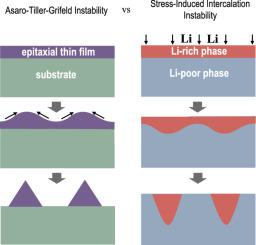当前位置:
X-MOL 学术
›
Acta Mater.
›
论文详情
Our official English website, www.x-mol.net, welcomes your
feedback! (Note: you will need to create a separate account there.)
Stress-Induced Intercalation Instability
Acta Materialia ( IF 8.3 ) Pub Date : 2020-12-01 , DOI: 10.1016/j.actamat.2020.09.059 Youtian Zhang , Ming Tang
Acta Materialia ( IF 8.3 ) Pub Date : 2020-12-01 , DOI: 10.1016/j.actamat.2020.09.059 Youtian Zhang , Ming Tang

|
We present a linear stability analysis to demonstrate that a flat coherent phase boundary formed by the (de)intercalation of solutes into a compound is unstable against perturbations with wavelengths larger than a critical wavelength. This critical wavelength is controlled by the competition between the interface energy and the elastic strain energy caused by the misfit between the solute-rich and solute-poor phases. It increases with the distance between the phase boundary and free surface of the compound, and so the instability is most pronounced when the boundary is close to the surface at the early stage of the (de)intercalation process. Numerical calculations show that such instability leads to non-uniform intercalation behavior. We find that uniform intercalation cannot be achieved unless the phase boundary moves at a speed greater than a critical velocity. Estimate of the magnitude of this velocity suggests that the stress-induced intercalation instability is generally operative in intercalation compounds used for battery applications.
中文翻译:

应力诱导的插层不稳定性
我们提出了一个线性稳定性分析,以证明由溶质(脱)插入化合物形成的平坦相干相边界对波长大于临界波长的扰动是不稳定的。这个临界波长是由界面能和由富溶质和贫溶质相之间的不匹配引起的弹性应变能之间的竞争控制的。它随着化合物的相界和自由表面之间的距离而增加,因此在(脱)嵌入过程的早期阶段,当边界靠近表面时,不稳定性最为明显。数值计算表明,这种不稳定性会导致不均匀的插层行为。我们发现,除非相界以大于临界速度的速度移动,否则无法实现均匀嵌入。对该速度大小的估计表明,应力引起的嵌入不稳定性通常在用于电池应用的嵌入化合物中起作用。
更新日期:2020-12-01
中文翻译:

应力诱导的插层不稳定性
我们提出了一个线性稳定性分析,以证明由溶质(脱)插入化合物形成的平坦相干相边界对波长大于临界波长的扰动是不稳定的。这个临界波长是由界面能和由富溶质和贫溶质相之间的不匹配引起的弹性应变能之间的竞争控制的。它随着化合物的相界和自由表面之间的距离而增加,因此在(脱)嵌入过程的早期阶段,当边界靠近表面时,不稳定性最为明显。数值计算表明,这种不稳定性会导致不均匀的插层行为。我们发现,除非相界以大于临界速度的速度移动,否则无法实现均匀嵌入。对该速度大小的估计表明,应力引起的嵌入不稳定性通常在用于电池应用的嵌入化合物中起作用。











































 京公网安备 11010802027423号
京公网安备 11010802027423号